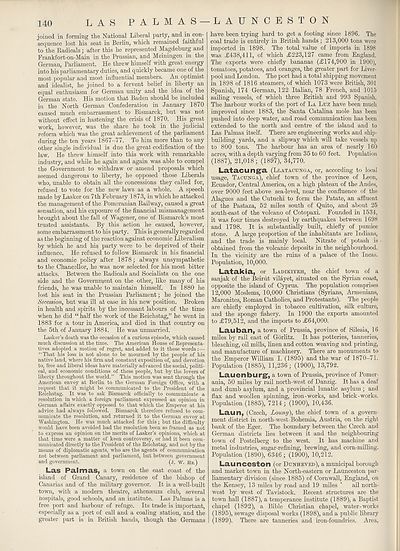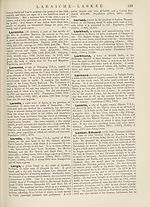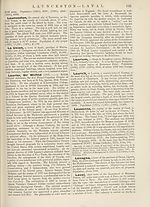New volumes of the Encyclopædia Britannica > Volume 30, K-MOR
(164) Page 140
Download files
Complete book:
Individual page:
Thumbnail gallery: Grid view | List view

140 LAS PALMAS-
joined in forming the National Liberal party, and in con¬
sequence lost his seat in Berlin, which remained faithful
to the Radicals; after this he represented Magdeburg and
Frankfort-on-Main in the Prussian, and Meiningen in the
German, Parliament. He threw himself with great energy
into his parliamentary duties, and quickly became one of the
most popular and most influential members. An optimist
and idealist, he joined to a fervent belief in liberty an
equal enthusiasm for German unity and the idea of the
German state. His motion that Baden should be included
in the North German Confederation in January 1870
caused much embarrassment to Bismarck, but was not
without effect in hastening the crisis of 1870. His great
work, however, was the share he took in the judicial
reform which was the great achievement of the parliament
during the ten years 1867-77. To him more than to any
other single individual is due the great codification of the
law. He threw himself into this work with remarkable
industry, and while he again and again was able to compel
the Government to withdraw or amend proposals which
seemed dangerous to liberty, he opposed those Liberals
who, unable to obtain all the concessions they called for,
refused to vote for the new laws as a whole. A speech
made by Lasker on 7th February 1873, in which he attacked
the management of the Pomeranian Railway, caused a great
sensation, and his exposure of the financial mismanagement
brought about the fall of Wagener, one of Bismarck’s most
trusted assistants. By this action he caused, however,
some embarrassment to his party. This is generally regarded
as the beginning of the reaction against economic Liberalism
by which he and his party were to be deprived of their
influence. He refused to follow Bismarck in his financial
and economic policy after 1878; always unsympathetic
to the Chancellor, he was now selected for his most bitter
attacks. Between the Radicals and Socialists on the one
side and the Government on the other, like many of his
friends, he was unable to maintain himself. In 1880 he
lost his seat in the Prussian Parliament; he joined the
Secession, but was ill at ease in his new position. Broken
in health and spirits by the incessant labours of the time
when he did “ half the work of the Reichstag,” he went in
1883 for a tour in America, and died in that country on
the 5th of January 1884. He was unmarried.
Lasker’s death was the occasion of a curious episode, which caused
much discussion at the time. The American House of Representa¬
tives adopted a motion of regret, and added to it these words
“That his loss is not alone to he mourned by the people of his
native land, where his firm and constant exposition of, and devotion
to, free and liberal ideas have materially advanced the social, politi¬
cal, and economic conditions of these people, but by the lovers of
liberty throughout the world. ” This motion was sent through the
American envoy at Berlin to the German Foreign Office, with a
request that it might be communicated to the President of the
Reichstag. It was to ask Bismarck officially to communicate a
resolution in which a foreign parliament expressed an opinion in
German affairs exactly opposed to that which the Emperor at his
advice had always followed. Bismarck therefore refused to com¬
municate the resolution, and returned it to the German envoy at
Washington. He was much attacked for this ; hut the difficulty
would have been avoided had the resolution been so framed as not
to express an opinion on the merits of Lasker’s opinions, which at
that time were a matter of keen controversy, or had it been com¬
municated directly to the President of the Reichstag, and not by the
means of diplomatic agents, who are the agents of communication
not between parliament and parliament, but between government
and government. (j. w. He.)
Las Palmas, a town on the east coast of the
island, of Grand Canary, residence of the bishop of
Canarias and of the military governor. It is a well-built
town, with a modern theatre, athenaeum club, several
hospitals, good schools, and an institute. Las Palmas is a
free port and harbour of refuge. Its trade is important,
especially as a port of call and a coaling station, and the
greater part is in British hands, though the Germans
LAUNCESTON
have been trying hard to get a footing since 1896. The
coal trade is entirely in British hands; 213,000 tons were
imported in 1898. The total value of imports in 1898
was ,£438,411, of which £223,127 came from England.
The exports were chiefly bananas (£174,900 in 1900),
tomatoes, potatoes, and oranges, the greater part for Liver¬
pool and London. The port had a total shipping movement
in 1898 of 1816 steamers, of which 1073 were British, 301
Spanish, 174 German, 122 Italian, 78 French, and 1015
sailing vessels, of which three British and 993 Spanish.
The harbour works of the port of La Luz have been much
improved since 1883, the Santa Catalina mole has been
pushed into deep water, and road communication has been
extended to the north and centre of the island and to
Las Palmas itself. There are engineering works and ship¬
building yards, and a slipway which will take vessels up
to 800 tons. The harbour has an area of nearly 160
acres, with a depth varying from 35 to 60 feet. Population
(1887), 21,018; (1897), 34,770.
Latacunga (Llatacunga, or, according to local
usage, Tacunga), chief town of the province of Leon,
Ecuador, Central America, on a high plateau of the Andes,
over 9000 feet above sea-level, near the confluence of the
Alagues and the Cutuchi to form the Patate, an affluent
of the Pastaza, 52 miles south of Quito, and about 25
south-east of the volcano of Cotopaxi. Founded in 1534,
it was four times destroyed by earthquakes between 1698
and 1798. It is substantially built, chiefly of pumice
stone. A large proportion of the inhabitants are Indians,
and the trade is mainly local. Nitrate of potash is
obtained from the volcanic deposits in the neighbourhood.
In the vicinity are the ruins of a palace of the Incas.
Population, 10,000.
La.ta.ki a., or Ladikiyeh, the chief town of a
sanjak of the Beirut vilayet, situated on the Syrian coast,
opposite the island of Cyprus. The population comprises
12,000 Moslems, 10,000 Christians (Syrians, Armenians,
Maronites, Roman Catholics, and Protestants). The people
are chiefly employed in tobacco cultivation, silk culture,
and the sponge fishery. In 1900 the exports amounted
to £79,512, and the imports to £64,000.
Lauban, a town of Prussia, province of Silesia, 16
miles by rail east of Gbrlitz. It has potteries, tanneries,
bleaching, oil mills, linen and cotton weaving and printing,
and manufacture of machinery. There are monuments to
the Emperor William I. (1895) and the war of 1870-71.
Population (1885), 11,236; (1900), 13,792.
Lauenburg, a town of Prussia, province of Pomer¬
ania, 50 miles by rail north-west of Danzig. It has a deaf
and dumb asylum, and a provincial lunatic asylum ; and
flax and woollen spinning, iron-works, and brick-works.
Population (1885), 7214; (1900), 10,436.
Latin, (Czech, Louny), the chief town of a govern¬
ment district in north-west Bohemia, Austria, on the right
bank of the Eger. The boundary between the Czech and
German districts lies between it and the neighbouring
town of Postelberg to the west. It has machine and
metal industries, sugar-refining, brewing, and corn-milling.
Population (1890), 6346; (1900), 10,212.
Launceston (or Dunheved), a municipal borough
and market town in the North-eastern or Launceston par¬
liamentary division (since 1885) of Cornwall, England, on
the Kensey, 13 miles by road and 19 miles ’ ail north-
west by west of Tavistock. Recent structures are the
town hall (1887), a temperance institute (1889), a Baptist
chapel (1892), a Bible Christian chapel, water-works
(1895), sewage disposal works (1898), and a public library
(1899). There are tanneries and iron-foundries. Area,
joined in forming the National Liberal party, and in con¬
sequence lost his seat in Berlin, which remained faithful
to the Radicals; after this he represented Magdeburg and
Frankfort-on-Main in the Prussian, and Meiningen in the
German, Parliament. He threw himself with great energy
into his parliamentary duties, and quickly became one of the
most popular and most influential members. An optimist
and idealist, he joined to a fervent belief in liberty an
equal enthusiasm for German unity and the idea of the
German state. His motion that Baden should be included
in the North German Confederation in January 1870
caused much embarrassment to Bismarck, but was not
without effect in hastening the crisis of 1870. His great
work, however, was the share he took in the judicial
reform which was the great achievement of the parliament
during the ten years 1867-77. To him more than to any
other single individual is due the great codification of the
law. He threw himself into this work with remarkable
industry, and while he again and again was able to compel
the Government to withdraw or amend proposals which
seemed dangerous to liberty, he opposed those Liberals
who, unable to obtain all the concessions they called for,
refused to vote for the new laws as a whole. A speech
made by Lasker on 7th February 1873, in which he attacked
the management of the Pomeranian Railway, caused a great
sensation, and his exposure of the financial mismanagement
brought about the fall of Wagener, one of Bismarck’s most
trusted assistants. By this action he caused, however,
some embarrassment to his party. This is generally regarded
as the beginning of the reaction against economic Liberalism
by which he and his party were to be deprived of their
influence. He refused to follow Bismarck in his financial
and economic policy after 1878; always unsympathetic
to the Chancellor, he was now selected for his most bitter
attacks. Between the Radicals and Socialists on the one
side and the Government on the other, like many of his
friends, he was unable to maintain himself. In 1880 he
lost his seat in the Prussian Parliament; he joined the
Secession, but was ill at ease in his new position. Broken
in health and spirits by the incessant labours of the time
when he did “ half the work of the Reichstag,” he went in
1883 for a tour in America, and died in that country on
the 5th of January 1884. He was unmarried.
Lasker’s death was the occasion of a curious episode, which caused
much discussion at the time. The American House of Representa¬
tives adopted a motion of regret, and added to it these words
“That his loss is not alone to he mourned by the people of his
native land, where his firm and constant exposition of, and devotion
to, free and liberal ideas have materially advanced the social, politi¬
cal, and economic conditions of these people, but by the lovers of
liberty throughout the world. ” This motion was sent through the
American envoy at Berlin to the German Foreign Office, with a
request that it might be communicated to the President of the
Reichstag. It was to ask Bismarck officially to communicate a
resolution in which a foreign parliament expressed an opinion in
German affairs exactly opposed to that which the Emperor at his
advice had always followed. Bismarck therefore refused to com¬
municate the resolution, and returned it to the German envoy at
Washington. He was much attacked for this ; hut the difficulty
would have been avoided had the resolution been so framed as not
to express an opinion on the merits of Lasker’s opinions, which at
that time were a matter of keen controversy, or had it been com¬
municated directly to the President of the Reichstag, and not by the
means of diplomatic agents, who are the agents of communication
not between parliament and parliament, but between government
and government. (j. w. He.)
Las Palmas, a town on the east coast of the
island, of Grand Canary, residence of the bishop of
Canarias and of the military governor. It is a well-built
town, with a modern theatre, athenaeum club, several
hospitals, good schools, and an institute. Las Palmas is a
free port and harbour of refuge. Its trade is important,
especially as a port of call and a coaling station, and the
greater part is in British hands, though the Germans
LAUNCESTON
have been trying hard to get a footing since 1896. The
coal trade is entirely in British hands; 213,000 tons were
imported in 1898. The total value of imports in 1898
was ,£438,411, of which £223,127 came from England.
The exports were chiefly bananas (£174,900 in 1900),
tomatoes, potatoes, and oranges, the greater part for Liver¬
pool and London. The port had a total shipping movement
in 1898 of 1816 steamers, of which 1073 were British, 301
Spanish, 174 German, 122 Italian, 78 French, and 1015
sailing vessels, of which three British and 993 Spanish.
The harbour works of the port of La Luz have been much
improved since 1883, the Santa Catalina mole has been
pushed into deep water, and road communication has been
extended to the north and centre of the island and to
Las Palmas itself. There are engineering works and ship¬
building yards, and a slipway which will take vessels up
to 800 tons. The harbour has an area of nearly 160
acres, with a depth varying from 35 to 60 feet. Population
(1887), 21,018; (1897), 34,770.
Latacunga (Llatacunga, or, according to local
usage, Tacunga), chief town of the province of Leon,
Ecuador, Central America, on a high plateau of the Andes,
over 9000 feet above sea-level, near the confluence of the
Alagues and the Cutuchi to form the Patate, an affluent
of the Pastaza, 52 miles south of Quito, and about 25
south-east of the volcano of Cotopaxi. Founded in 1534,
it was four times destroyed by earthquakes between 1698
and 1798. It is substantially built, chiefly of pumice
stone. A large proportion of the inhabitants are Indians,
and the trade is mainly local. Nitrate of potash is
obtained from the volcanic deposits in the neighbourhood.
In the vicinity are the ruins of a palace of the Incas.
Population, 10,000.
La.ta.ki a., or Ladikiyeh, the chief town of a
sanjak of the Beirut vilayet, situated on the Syrian coast,
opposite the island of Cyprus. The population comprises
12,000 Moslems, 10,000 Christians (Syrians, Armenians,
Maronites, Roman Catholics, and Protestants). The people
are chiefly employed in tobacco cultivation, silk culture,
and the sponge fishery. In 1900 the exports amounted
to £79,512, and the imports to £64,000.
Lauban, a town of Prussia, province of Silesia, 16
miles by rail east of Gbrlitz. It has potteries, tanneries,
bleaching, oil mills, linen and cotton weaving and printing,
and manufacture of machinery. There are monuments to
the Emperor William I. (1895) and the war of 1870-71.
Population (1885), 11,236; (1900), 13,792.
Lauenburg, a town of Prussia, province of Pomer¬
ania, 50 miles by rail north-west of Danzig. It has a deaf
and dumb asylum, and a provincial lunatic asylum ; and
flax and woollen spinning, iron-works, and brick-works.
Population (1885), 7214; (1900), 10,436.
Latin, (Czech, Louny), the chief town of a govern¬
ment district in north-west Bohemia, Austria, on the right
bank of the Eger. The boundary between the Czech and
German districts lies between it and the neighbouring
town of Postelberg to the west. It has machine and
metal industries, sugar-refining, brewing, and corn-milling.
Population (1890), 6346; (1900), 10,212.
Launceston (or Dunheved), a municipal borough
and market town in the North-eastern or Launceston par¬
liamentary division (since 1885) of Cornwall, England, on
the Kensey, 13 miles by road and 19 miles ’ ail north-
west by west of Tavistock. Recent structures are the
town hall (1887), a temperance institute (1889), a Baptist
chapel (1892), a Bible Christian chapel, water-works
(1895), sewage disposal works (1898), and a public library
(1899). There are tanneries and iron-foundries. Area,
Set display mode to:
![]() Universal Viewer |
Universal Viewer | ![]() Mirador |
Large image | Transcription
Mirador |
Large image | Transcription
Images and transcriptions on this page, including medium image downloads, may be used under the Creative Commons Attribution 4.0 International Licence unless otherwise stated. ![]()
| Encyclopaedia Britannica > New volumes of the Encyclopædia Britannica > Volume 30, K-MOR > (164) Page 140 |
|---|
| Permanent URL | https://digital.nls.uk/193569633 |
|---|
| Attribution and copyright: |
|
|---|---|
| Shelfmark | EB.18 |
|---|---|
| Description | Ten editions of 'Encyclopaedia Britannica', issued from 1768-1903, in 231 volumes. Originally issued in 100 weekly parts (3 volumes) between 1768 and 1771 by publishers: Colin Macfarquhar and Andrew Bell (Edinburgh); editor: William Smellie: engraver: Andrew Bell. Expanded editions in the 19th century featured more volumes and contributions from leading experts in their fields. Managed and published in Edinburgh up to the 9th edition (25 volumes, from 1875-1889); the 10th edition (1902-1903) re-issued the 9th edition, with 11 supplementary volumes. |
|---|---|
| Additional NLS resources: |
|

